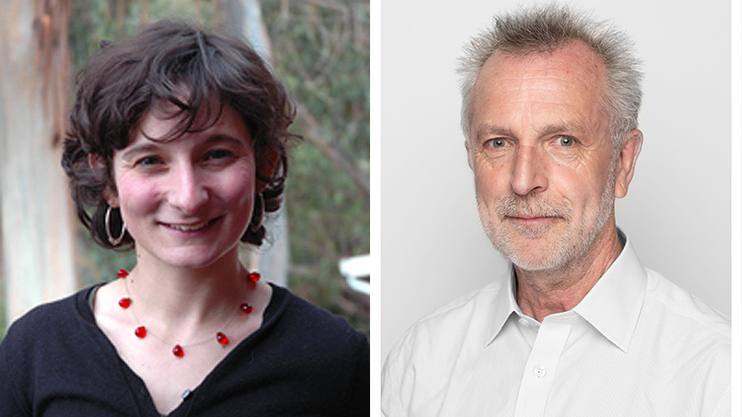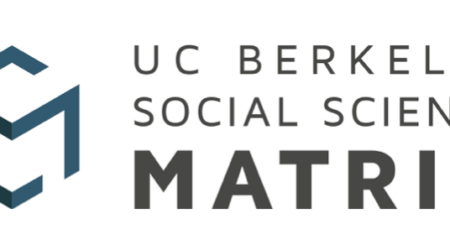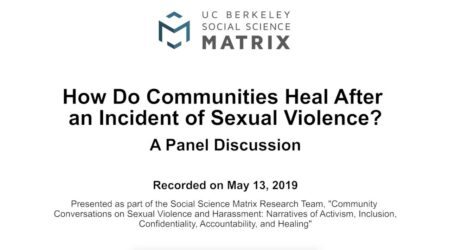We are pleased to announce that Marion Fourcade, Professor in the Department of Sociology, has been appointed Director of Social Science Matrix. She will assume the role previously held by Professor Bill Hanks, who stepped down following a successful six-year term as the center’s founding director.
During the 2019-2020 academic year, Fourcade will serve as Distinguished Visiting Professor at the Institute of Advanced Study at Princeton University, and so will begin her term at Matrix on July 1, 2020. In the interim, Michael Watts, Professor Emeritus of Geography, will serve as the Director of Matrix for the forthcoming academic year, effective July 1, 2019.
 Under Hanks’ leadership, Social Science Matrix has established itself as an important resource for the UC Berkeley social science community, hosting hundreds of conferences, workshops, symposia, book discussions, and distinguished lectures by prominent scholars, and convening more than 70 Matrix Research Teams, interdisciplinary groups of scholars who gathered to pursue early-stage research focused on emerging social science questions and tackling globally significant issues like climate change, immigration, and artificial intelligence.
Under Hanks’ leadership, Social Science Matrix has established itself as an important resource for the UC Berkeley social science community, hosting hundreds of conferences, workshops, symposia, book discussions, and distinguished lectures by prominent scholars, and convening more than 70 Matrix Research Teams, interdisciplinary groups of scholars who gathered to pursue early-stage research focused on emerging social science questions and tackling globally significant issues like climate change, immigration, and artificial intelligence.
Among its many activities, Matrix has also hosted three cohorts of Dissertations Fellows; established a network of 25 Affiliated Centers across campus; and forged important international partnerships, creating bilateral exchange programs with Sciences Po in Paris and Freie Universität, Berlin.
“Working with Carla Hesse, former Dean of the Social Sciences Division, Bill [Hanks] formed Matrix into a cutting-edge research institute that responded to the particular needs of Berkeley’s social science community,” said Kim Voss, Acting Dean of the Division of Social Sciences, in an announcement. “As an incubator and accelerator for early-stage research and a platform for cross-disciplinary collaboration, Matrix has attained national distinction under Bill’s leadership and emerged as a singular entity on campus. A linguistic anthropologist with deep historical commitments, Bill’s ability to fruitfully complicate the intellectual contours that undergird disciplinary thought has indelibly shaped Matrix and its mission.”
Professor Fourcade is well poised to build on this foundation, as she brings an exceptionally strong understanding of Matrix’s role within the division and a clear vision of how to expand the impact of its programs and initiatives. Fourcade served as Interim Director of Matrix in 2018, when she launched initiatives such as the Solidarity Series, a series of talks and panels focused on exploring and critiquing the ethical foundations, concrete implementations, and prospective designs that have fostered (or may foster) connectedness, inclusiveness, tolerance, and equality. She founded the Center on Economy and Morality, a Matrix-affiliated center, and she has led and/or participated in diverse Matrix Research Teams, including Seeing Like a Valley: Locating the Moral Visions of Silicon Valley Culture; Political Economy and Society Curriculum; Examining the Global Reach of Algorithms; and Work and Politics in the Digital Era.
Fourcade is “an innovative scholar whose numerous publications have taken an expansive, historical, and comparative approach to the sociology of economic knowledge, political practices, and digital society,” Voss said. “Known as a willing and resourceful collaborator, she has contributed to the work of several research centers on campus and built coalitions with scholars nationally and internationally, most notably as co-director of the Max Planck-Sciences Po Center on Coping with Instability in Market Societies. Marion is also an award-winning mentor with an established track record of championing the research of graduate students.” Fourcade’s book, Economists and Societies: Discipline and Profession in the United States, Britain, and France, 1890s to 1990s, won several awards, including the Ludwik Fleck Prize from the Society for the Social Studies of Science and the American Sociological Association’s Distinguished Book Award.
“Matrix is a unique institution,” Fourcade says. “Its mission is to serve as a catalyst of innovation in the social sciences, to foster conversations across the disciplines, and to discover new territories for research. We are deeply indebted to Bill Hanks and Carla Hesse for turning this ambitious vision into a lively reality, complete with a gorgeous physical space, a well-functioning infrastructure, and a vital intellectual role on campus.”
Marion intends to build on Matrix’s track record in serving the broader social science community for the organization of special events, workshops, and lectures, as well as in supporting innovative interdisciplinary seminars and research projects. Her priorities include increasing outreach through the cultivation of relationships with departments in the division and with other research units on campus (a model pioneered by the D-Lab/Matrix series on “social science and data science”); working with graduate students to provide intellectual support and better exposure for their research; and fostering connections to non-academic publics. “Matrix is for everyone,” Fourcade says.
Matrix’s work will be closely articulated with several of the signature initiatives on campus. “We want to focus on present-day challenges facing human societies, be they political (rising illiberalism and authoritarianism), technological (artificial intelligence, genetic modification), or ecological (climate change). As social scientists, we want to understand how these challenges transform our physical environment, our social world, and our sense of who we are; how they recycle old forms of power and marginality, but also create new ones; and how they might foster new opportunities, ideals, and aspirations. These questions all demand interdisciplinary conversations. Matrix will be actively engaged in cultivating those cross-field synergies that are already well established, while helping initiate other, less familiar ones.”
In his role as Interim Director, Professor Michael Watts will similarly bring a wealth of leadership experience to Matrix, as he formerly served as Director of the Institute of International Studies and Chair of the Trustees of the Social Science Research Council. Watts’ pioneering scholarship on the political economy of development has integrated thinking in the fields of anthropology, ecology, and sociology. He has been recognized internationally for his leadership, exemplary scholarship, and mentorship of graduate students; most recently, he was honored by election as Corresponding Fellow of the British Academy. His publications include Silent Violence: Food, Famine and Peasantry in Northern Nigeria (1983; 2013), which was a runner-up for the Herskovitz Prize, and The Curse of the Black Gold (2008). “Michael is uniquely capable of ensuring Matrix’s successful transition this year,” Voss said.
As Interim Director of Matrix, Watts says that he intends to continue to promote and fund research teams and lectures, while providing “new support for reading groups, book manuscript development for junior faculty, inter-disciplinary doctoral dissertation proposal workshops, and a venue for book launches and the chance for authors to ‘meet their critics’ in wide ranging discussions.” He also plans to launch new event series that “speak to the current moment,” focusing on such topics as “the challenges of climate change and forms of life in the Anthropocene; the challenges associated with large-scale displacement and mobility of human populations, particularly in relation to civil conflict, war, and endemic violence (and of climate change); and, in view of the looming US elections in 2020, the broad theme of race, class, and authoritarian politics.” He also plans to “host discussions next spring, explicitly comparative in nature, drawing in our historical strength in area studies on the Berkeley campus, addressing the relations between neoliberalism, globalization, and authoritarian populisms of various stripe.”
“While the foundations for Matrix are now in place, I hope to continue and extend the yeoman work of Bill Hanks, who has developed connections, linkages, and networks among faculty and students across the social science division, while building new relations with the area studies programs, the many research centers on campus, and the professional schools, all of which have social scientists in their ranks,” Watts said. “I am delighted to be able to assist in this transitional period prior to Marion [Fourcade] taking up her appointment, and am looking forward to working with faculty and students across the campus. Matrix has served an exceptionally generative role in both promoting and advocating the exciting inter-disciplinary social scientific research being conducted on campus, while at the same time seeding and incubating early-stage research.”



